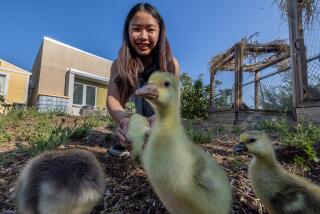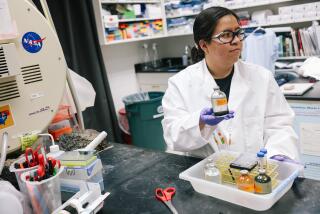New Class Will Give a Lesson in Growing Plants in ‘Factory’
Right now, a plant laboratory in Santa Paula is churning out prime specimens of asparagus cloned at a rate of 20,000 plants a year.
The asparagus produced at the Twyford Plant Lab--cloned from one superior, delicately flavored, tender, slender-stemmed specimen--will never touch soil. Instead, it will be cultivated in plastic containers.
Today, about 20 community college students and high school teachers--part of their own experiment in education--will tour the plant “factory.”
As the first students of Ventura College’s new plant biotechnology program, they will learn how agricultural geneticists make tomatoes stay ripe longer, give plants natural protection from pests and weeds, and extract curative potions from rain forest flora.
The students will be among the first in the state to earn a certificate in plant biotechnology from a community college. And the teachers--mainly science instructors from throughout the county--will take their knowledge back to the classroom.
The new program, made possible by a $30,500 grant from the Santa Paula-based Hanson Trust, places Ventura College at the head of statewide initiative to expand its community college science programs into the field of biotechnology.
Robert Renger, Ventura College science department chairman and member of a state community college committee on economic development, said the committee targeted plant biotechnology as one of the fastest-growing job areas in the state.
“In 10 years, there will be about 100 times as many products that come from plant biotechnology than [animal] biotechnology,” said Bill Thieman, the instructor who will teach the class.
Biotechnology geneticists rely on genes from animal cells rather than plant cells, explained Thieman.
But plant-derived products are less strictly regulated by the federal government, so the industry is rushing to invest in them, he said.
“They can get their products to the market in a much shorter time, and much more easily,” he said.
That means more varieties of fruit and vegetables developed to stay ripe longer and repel bugs naturally.
And while research has for years been experimenting with the genes of plants, it is only in the past several years that genetically engineered tomatoes, green peppers and carrots began hitting America’s dinner tables, said Peter Tolley, a lab manager at Twyford.
“It is an area that is continuing to increase in employment,” he said. “It it will continue to go up as long as we are still battling insects and learning more about the genetics of these plants.”
Although some community college students have enrolled, the six-week class is for now targeting high school teachers who can incorporate what they learn into their biology curriculum.
Hugh Nelson, a science instructor from Newbury Park, said he sees the program as a way of preparing his students for the future.
“My kids eat this stuff up,” he said. “It’s in the newspapers every day and it’s on television.”
So far about 20 students are slated to enroll in the class, and more are expected, said Thieman.
“They just keep adding students,” he said. “I have had all kind of calls even from outside of the county.






